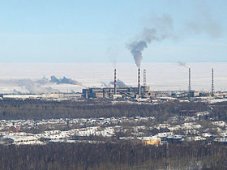Russia Environmental Issues
Climate issues in Russia
Russia produces a significant portion of the world’s greenhouse gas emissions and is therefore an important country in the international climate negotiations. The Kyotoprotocol did not come into force before it was ratified by Russia. Nevertheless, Russia's positions in the coming climate negotiations are an open question. Russian science and public has taken a more sceptical position to man-made climate change then the rest of the world, school education is weak and it is very little public information available about climate change. Since the county is rich on oil, gas and coal, fossil fuel is a priority together with maintaining its nuclear capacity.
Challenges in relation to nuclear-waste and accidents
The first generation nuclear reactors have reached their designed lifespan. The oldest existing Chernobyl-type RBMK-1000 unit of Leningrad NPP and the oldest model of VVER-440 power unit of Kola NPP reached their designed lifespan in 2003.
The first generation reactors create a higher probability of nuclear accidents, and should be closed at the planned expiry date. They should not be granted permits for prolonged operation. Necessary funds for decommissioning must be established, and the preparation of decommissioning started.
By-products of nuclear weapons production caused permanent damage near Tomsk and Krasnoyarsk in southern Siberia, and near Chelyabinsk in the Ural Mountains. Fallout from the 1986 explosion at Ukraine’s Chernobyl’ nuclear power plant affected Russia primarily in Bryansk Oblast (see Chernobyl’ Accident). Less well-known than the Chernobyl’ disaster were accidents at the Mayak nuclear weapons production plant near Chelyabinsk in 1949, 1957, and 1967, which together released significantly higher emissions than Chernobyl’
The Soviet military tested nuclear weapons on the islands of Novaya Zemlya in the Arctic Ocean, which was their second testing site after Semipalatinsk (now Semey), Kazakhstan. Nuclear reactors and wastes were dumped into the Barents and Kara seas of the far north, and in far eastern Siberia. Dumping of nuclear wastes in the Sea of Japan (East Sea) continued until 1993. The disposal of nuclear submarines and nuclear waste is still a problematic issue. Although a number of nuclear submarines have been decommissioned, many are still docked at Russian ports as a result of a lack of money and facilities for storing nuclear wastes.
Erosion and degradation of land and water
Land and water resources experienced severe degradation during the Soviet period. Some areas, such as the Kuznetsk Basin on the Tom’ River in southern Siberia, the industrial belt along the southern portion of the Ural Mountains, and the lower Volga River, were degraded beyond repair.











